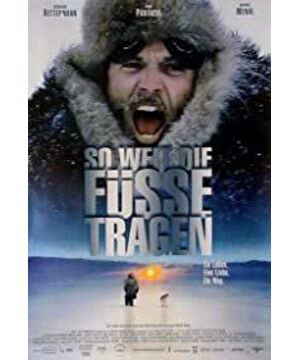This is a film based on a true story, which was written as a novel by Joseph Martin Bauer in 1955, and which was filmed in Germany in 1959. The film was filmed in Germany in 2001. The protagonist, Cornelius Rost (1922-1983), has been incognito for fear of being tracked by the KGB, so novels, TV shows, and movies have used pseudonyms.
The film begins with the separation of the protagonist from his wife and daughter, then skips the war scene and jumps directly to the Soviet trial—25 years of labor reform. Then a train carrying a hundred and ten people moved forward in a field of ice and snow. One of the German soldiers who was familiar with the terrain explained: We are going to Cape Diniv, where is Cape Diniv? First you have to go through the Ural Mountains, then you will reach Asia after crossing the Ural Mountains, then the Yenisei River, then the Lena River to the east, and then to the northeast to enter the Arctic Circle, the most east is. From the map, Diniff Point is only a few hundred kilometers away from Alaska. People with good water and not afraid of cold or hunger can swim across the Bering Strait to the United States.
It's such a long way, even by train, the distance of hemorrhoids can be made. The protagonist just relied on his own perseverance, extraordinary courage and determination to go home, and escaped in a snowy night after 5 years of forced labor. With the help of a German doctor who wanted to escape but was suffering from cancer, he took clothes, a knife, an alcohol stove, a pistol + 12 rounds of ammunition, two pounds of bacon, a few pounds of dry bread, and a simple hand-drawn map. Luggage departed. Doctors advised him to go north to avoid the search, then follow the Arctic Ocean west to the Lena River and then south. Such an unexpected route allowed him to escape in the first few months, leading most of the Soviets who could not find him to believe that he had frozen to death in the snow. Except for that same stalwart Soviet officer, because he believed that the man's will made him sure to survive.
Several times he almost died on the way, but fortunately God treated him well. When he was about to starve to death, he prayed to God, so a seal came out from the edge of the Arctic Ocean, with meat and fat; The gold digger saved his life and went on the road together. At this time, he was still 10,000 kilometers away from home. When the gold digger knocked down the cliff for gold, and was about to be eaten by wild wolves, a group of Yakutsk natives took it again. He was rescued from the gate of hell, and at the same time, he stayed with one of the beautiful widows for a period of time until he was completely healed. When he left, he got a husky sent by the natives~ This husky was reported to him by a group of lumberjacks. When it came to a Soviet officer, Husky sacrificed himself to save, and the protagonist escaped again. When he arrived in Central Asia, he was no different from a beggar. At this time, a kind-hearted Jew gave him clothes, money, and a passport. . The Jews were then found by Soviet officers and committed suicide by taking poison. After going through untold hardships, we finally reached the border between Turkmenistan and Iran. After crossing the bridge, we reached Iran, but the Soviet officer had been waiting on the bridge for a long time. . At this time, a miracle appeared again. Perhaps it was his feat of escaping 14,000 kilometers in three years that moved the Soviets. Perhaps the Jews said before dying: "I did help him, and everyone will help him." Conscience found that the Soviets even turned aside this time and let him go to Iran. As a result, when he arrived in Iran, he was caught as a Soviet spy. . He told his own situation. Iran asked his uncle to recognize him, but his uncle didn't recognize him as time passed. Fortunately, his uncle brought a photo album, which was a photo given to his mother in 1937, so that the two could recognize each other. .
Finally, on a Christmas night, he returned home and was reunited with his wife and daughter after 8 years, and everyone was happy.
Some people say that this is the Shawshank of Germany, but I do not agree with it. Shawshank is an example of 20 years of careful preparation, planning and action. The main highlight is the humiliation and wisdom of the past 20 years. The protagonist of this film has a strong desire to escape from the very beginning, and he has no time or opportunity to prepare, because after staying here for a long time, everyone will be lead poisoning, not to mention the coal mine landslide, typhoid fever, etc. that may occur at any time. His escape depended on will and the help of countless kind people, as well as God's blessing. The German doctor who started especially laid the foundation for him to flee in the early days, while the Jews of the later period retaliate with Germany. Without the passport he provided, he could not have left the great Union of Soviet Socialist Republics at all.
Many World War II films from a German perspective give people a deep reflection on the ruthlessness of the war, the trauma after the war, and the kind people. This film is like this. There is no accusation, no sensationalism, only true cruelty.
View more about As Far as My Feet Will Carry Me reviews











